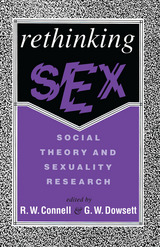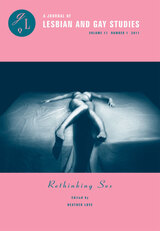2 books about Rethinking Sex

Rethinking Sex
Social Theory and Sexuality Research
R. Connell
Temple University Press, 1993
Sex and Gender Section Award for Distinguished Contribution to the Study of Sex and Gender, American Sociological Association, 1995
This volume of essays sharply questions current knowledge and ideas about sexuality, social theory, and public policy research on sexuality. The contributors, internationally recognized scholars and activists from Australia, examine the dominant research models from the United States and Western Europe and propose a new perspective, one sensitive to the social construction of sexuality and its research and to variation in sexual practices across cultures.
Addressing the debates over sexual conduct from contraception to AIDS prevention, Rethinking Sex provides a systematic examination of the social dimensions of sexuality. Social theory, public policy analysis, and historical and survey research are applied to issues ranging from AIDS and gay identity to perceptions of women's sexuality and relations between the state and private sexual behavior.
"Sexuality is a major theme in our culture, from the surf video to the opera stage to the papal encyclical. It is, accordingly, one of the major themes of the human sciences, and figures as weighty as Darwin and Freud have made major contributions to it. Social research has, over the last hundred years, produced crucially important evidence for the understanding of sexuality. But social theory has been slow to grapple with the issue, to give it the sophisticated attention that has been devoted to questions of production or of communication.
"We are convinced that an adequate social theory of sexuality is essential for progress on 'applied' issues, such as the design of research on the social transmission of human immunodefiency virus (HIV). This chapter attempts a mapping exercise, sorting out the major intellectual frameworks that have governed Western thinking about sexuality. We discuss first the religious and scientific nativism that dominated the field into the twentieth century, the problems this approach ran into, and the rise of social construction approaches to sexuality. We discuss the impasse that social constructionism has reached. In the final part of the chapter we sketch the outline of an approach which can move past these difficulties."
--From Chapter 3, "'The Unclean Motion of the Generative Parts': Frameworks in Western Thought on Sexuality"
[more]

Rethinking Sex, Volume 17
Annemarie Jagose, Ann Cvetkovich, and Heather K. Love, special issue editors
Duke University Press
This special issue of GLQ celebrates the twenty-fifth anniversary of the publication of Gayle Rubin’s groundbreaking essay, “Thinking Sex: Notes for a Radical Theory of the Politics of Sexuality.” Credited with inaugurating the contemporary field of sexuality studies, Rubin’s essay calls for an “autonomous theory and politics specific to sexuality.” Looking at the intellectual and political gains of sexual freedom movements over the past two decades, “Rethinking Sex” explores the critical and activist afterlife of the controversial 1982 Barnard College Conference on Sexuality, where Rubin originally presented the essay.
In her contribution to this special issue, Rubin reflects on her earlier essay and examines developments in “pro-sex” feminism since the publication of “Thinking Sex.” Other noted scholars assess the significance of Rubin’s work for histories of sexuality and for new areas in queer studies, such as transgender studies, disability studies, and transnational studies. In honoring Rubin’s scholarship, the contributors address the history of sexual theory and politics and the forms that they might take in the twenty-first century.
In her contribution to this special issue, Rubin reflects on her earlier essay and examines developments in “pro-sex” feminism since the publication of “Thinking Sex.” Other noted scholars assess the significance of Rubin’s work for histories of sexuality and for new areas in queer studies, such as transgender studies, disability studies, and transnational studies. In honoring Rubin’s scholarship, the contributors address the history of sexual theory and politics and the forms that they might take in the twenty-first century.
[more]
READERS
Browse our collection.
PUBLISHERS
See BiblioVault's publisher services.
STUDENT SERVICES
Files for college accessibility offices.
UChicago Accessibility Resources
home | accessibility | search | about | contact us
BiblioVault ® 2001 - 2024
The University of Chicago Press









